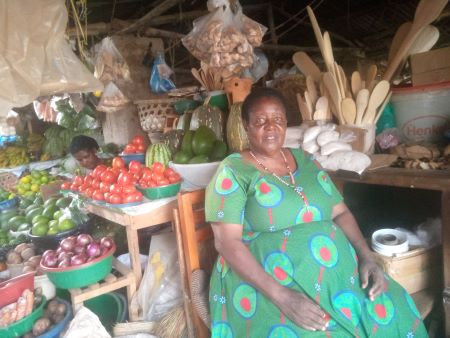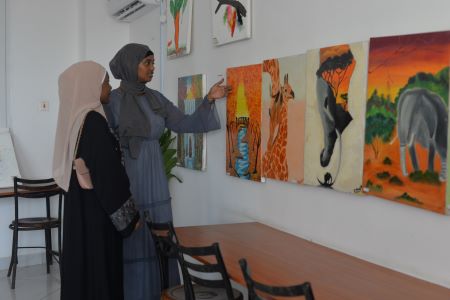Aaron Ainomugisha,
In 1990, Ms. Jane Bigirwa lost her husband, becoming a young widow at the age of 26. She was working as a primary teacher, a job she later quit to begin a small retail shop in Kiyanja, Kamukuzi, Mbarara district (now city) in western Uganda.

Rwebikoona Market 1
In 2004, Jane set up a foodstuffs stall in Rwebikoona market in Mbarara, where she has thrived for the last 20 years. Her success story is one of the untold stories highlighting how Ugandan and African market women are thriving amid different setbacks, with most of them being widows or single mothers, victims of domestic violence, and other vulnerable women and girls fending for their families.
In this in-depth story, Mr. Aaron Ainomugisha, 2024 African Change Narrative Storytellers’ Fellow (under Africa Foundation for Young Media Professionals -AFYMP) unpacks Jane’s experience, and how it relates with other many market women across Uganda and Africa.

Rwebikoona market 2
Jane, who doubles as the Vice Chairperson of Rwebikoona market has not shifted from this market for the last 20 years, where she still sells tomatoes, onions, yellow bananas, different fruits and other food stuffs.

Jane Bigirwa (PC: Aaron)
“I quit teaching and started a small shop and I later entered this market. All I have today, I thank this market. I was a young lady when my husband died, but I refused to remarry. Now I have the capacity to acquire Ugx50 million loan and repay in time. We thank the government for supporting women rights here in Uganda,” she narrates.
“My husband left me with two children, but I had others that I took care of – as extended family. They are four sons and one daughter altogether. All of them are now graduates and married. I always advise young women who lose their husbands to concentrate on fending for their families and fully provide for their children. I have been in this market for 20 years. I have been in business since 1990 when my husband died. I have a big goal of becoming a focal mentor and counselor for all market women from the entire city even after leaving this market,” she added.
Jane implored young ladies to embrace businesses or entrepreneurship, instead of depending on men for everything.
“If someone finds you sitting on this stall, he/she cannot understand how you benefit. Even some people disrespect us, but by the end of every year, I have saved a lot and I realize my targets. Young people should join businesses. Most of us here are women. That is because of the rights and freedom we have,” said.
SAVINGS & ARCHIEVEMENTS AS A MARKET WOMAN: Jane, who is currently 60 years old, says she doesn’t count on daily or monthly profits, but instead she sets annual targets.
For the last 20 years, she has been able to acquire land and other properties including her home in Kamukuzi where she is also a landlady, on top of other achievements. She has also mentored fellow women whom she has inspired and encouraged to join, and sustain businesses.
WOMEN – MEN RATIO IN UGANDAN MARKETS: Mbarara city currently has seven markets including Rwebikoona market, Kiyanja/Kamukuzi, Koranorya/Biharwe, Ruti/Nyamitanga, Kijungu/Nyamityobora, Kakoba and the new Mbarara central market, where most of the vendors are women including widows and single mothers. In Rwebikoona market, out of the 500 vendors, 320 are women.
Mr. Laban Tugume, the secretary in Rwebikoona market says they have five representatives of women on their committee, who are responsible for resolving women issues in the market.
Loydah Twikirize, one of the female vendors in this market said they have harmoniously worked with men for years.
MORE MARKETS FOR BIGGER MPACT: The government of Uganda has so far constructed modern markets in Soroti, Fort Portal, Kabala, Mbarara and other areas to create conducive working environment for the vendors across the country. However, vendors still decry hindrances like heavy taxes, high electricity and water rates, lack of enough toilets, and other challenges.
WHAT DO THE LEADERS HAVE TO SAY AND DO? According to Hon Atukwasa Rita Bwahika, a policy analyst and Woman Member of Parliament for Mbarara city in the 11th Parliament, there is a milestone covered in empowering women in Uganda, but there are still persistent challenges especially policy gaps, and stereotypes about women.
“For the market women, most of them are already victims of domestic violence or gender-based violence. I understand that there are positive stories, but we shouldn’t be blinded by those to relax. Women should operate in a safer environment, and invest their money for socioeconomic transformation. As leaders, we’ll continue championing moves to have better policies,” Hon. Rita explained.
MARKET POLICIES: In 2023 the Markets Act 2023 was enacted in Uganda, as one of the efforts geared towards transforming lives of majority of Ugandans in order to attain Vision 2040, “strengthening the fundamentals of the economy to harness the abundant opportunities around the country”.

Hon Atukwasa Rita Bwahika – Woman MP Mbarara city.
With this new law in place, ownership of markets has been opened up, to include individual operators so long as they acquire license.
Women rights advocates continue to challenge authorities and other stakeholders to uphold women’s rights while enforcing this law, and other interventions to accelerate women’s socioeconomic empowerment and progress.




